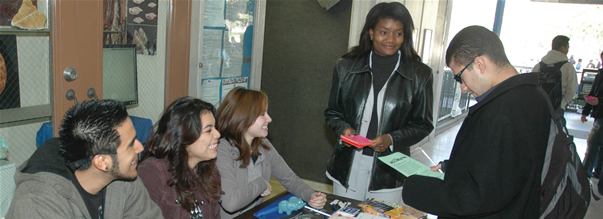Campaign Calls for 2 Hours per Unit
Campaign encourages freshmen to spend more time studying science and math
January 29, 2007
By Debra Cano Ramos
Launched last semester by the College of Natural Sciences and Mathematics
(NSM), the Study 25-35 Campaign targets freshmen and encourages them to
spend more time studying science and math.
“Math and science are difficult subjects, and we’re not sure
if students are putting in the study hours needed to make them successful
in these subjects. If students put in more effort, they are going to get
better grades,” said Gina Garcia, student retention and assessment
coordinator.
Rochelle Woods, NSM assistant dean, added that often, freshmen don’t
realize the study expectations in college, so they fall short.
“They don’t understand the amount of work they need to put in
to get the good grades, so we’re educating them on what they need to
do to improve their study habits and be successful in their course work,” Woods
said. “Our goals are to reduce the number of students on probation
and increase the number of students on the Dean’s List.”
Of nearly 300 freshmen majoring in STEM (science, technology, engineering
and mathematics) disciplines during the fall semester in 2004, 82 were on
academic probation (students with a grade point average lower than 2.0) while
40 made the Dean’s List (students with a grade point average of at
least 3.5) after their first semester. In the fall of 2005, there were 26
more students on academic probation while eight fell off the Dean’s
List.
Mark S. Filowitz, chemistry lecturer, said the campaign, which was introduced
in the Cal Poly San Luis Obispo College of Science and Mathematics in 2001,
now is helping to reach CSUF students who may need an extra push.
He said that if the students gain good study habits, “then we will
achieve the goal of having many more students who remain committed to
the study of sciences and mathematics.”
New college students need to
spend more than 35 hours a week to be academically successful, Garcia said.
Under the campaign, it is suggested that students taking 12 units study 25
hours a week and those taking 16 units study at least 35 hours, which equates
to about two hours per unit each week.
NSM faculty members are promoting the program and some are awarding extra
credit to the students who participate.
Bill Hoese, associate professor of biological science, who teaches Evolution
and Biodiversity (Biology 171), is among those giving extra credit to students
who track the time they spend studying throughout the semester.
Student reaction to the study campaign has been positive, Hoese said.
“Because college is so different from high school, I think many students
appreciate guidance on how much to study,” he said.
For more information on the campaign, visit:
http://nsm.fullerton.edu/25-35.asp.

